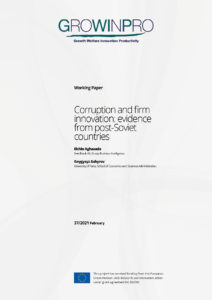In view of the missing consensus on how corruption relates to firm innovation, this paper empirically studies the relationship between petty corruption and product, process, marketing and organizational innovations in the post-Soviet region. Exploiting cross- sectional firm-level data from the fifth round of the Business Environment and Enterprise Performance Survey (BEEPS V), the paper argues that institutional context has utmost importance when approaching this link. Probit estimations for a full sample of post-Soviet countries indicate a positive link between bribes and firm innovation. Considering variations in institutional development levels, the paper distinguishes three clusters of countries within the region with respect to the quality of institutional structures based on Worldwide Governance Indicators (WGI) data from the World Bank. The results reveal that the grease-the-wheel effect of bribery on firm innovation strongly remains in countries with weak institutional quality. To explore this link further, the paper made several additional estimations and robustness checks.

